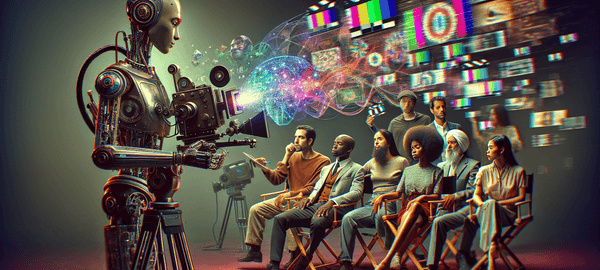AI technology sparks controversy in filmmaking, challenging directors’ creative control and ethics.
The film industry is witnessing a seismic shift as AI technology infiltrates every aspect of production. From script analysis to visual effects, AI is reshaping how movies are made. This transformation echoes the impact of AI on other creative fields, as discussed in our recent exploration of AI’s role in visual storytelling. However, not all filmmakers are embracing this digital revolution with open arms.
As a composer, I’ve grappled with similar dilemmas. Once, I experimented with AI-generated melodies for a film score. The results were surprisingly good, but I felt a nagging sense of artistic betrayal. It made me question the essence of creativity and the role of human touch in art. This experience resonates deeply with the current debate in filmmaking.
AI in Filmmaking: A Double-Edged Sword
Director Morgan Neville’s experience with AI in his Anthony Bourdain documentary has left him vowing never to use the technology again. In an interview with WIRED, Neville describes his AI experiment as ‘more of an Easter egg’ that ‘became a landmine.’ This incident highlights the ethical quandaries filmmakers face when employing AI technology.
The controversy stems from using AI to recreate Bourdain’s voice, raising questions about authenticity and consent in posthumous portrayals. Neville’s decision to forgo AI in future projects reflects growing concerns in the industry about the technology’s impact on creative integrity and audience trust.
Despite these concerns, AI continues to make inroads in filmmaking. From script analysis to visual effects, the technology offers unprecedented efficiency and possibilities. However, Neville’s experience serves as a cautionary tale, emphasizing the need for careful consideration of AI’s role in creative processes.
AI Technology Revolutionizes Film Pre-Production
Imagine a startup that develops an AI-powered pre-production platform for filmmakers. This innovative tool would use advanced algorithms to analyze scripts, suggest optimal shooting locations, create detailed storyboards, and even generate preliminary visual effects concepts. By streamlining these early stages of film production, the platform could significantly reduce costs and time, allowing filmmakers to focus more on creative aspects. The business model could include subscription tiers for different production scales, from indie filmmakers to major studios, with additional revenue from custom AI model training for specific production needs. This AI-driven approach could revolutionize how films are planned and budgeted, potentially disrupting the entire pre-production industry.
Navigating the AI Frontier in Film
As AI technology continues to evolve, filmmakers face a crucial crossroads. The promise of enhanced efficiency and creative possibilities must be balanced against ethical considerations and the preservation of human artistry. What role do you think AI should play in filmmaking? How can we harness its potential while maintaining the integrity of the creative process? Share your thoughts on this fascinating intersection of technology and art. Let’s explore how we can shape a future where AI enhances, rather than replaces, human creativity in film.
AI in Filmmaking FAQ
Q: How is AI currently being used in filmmaking?
A: AI is used in various aspects of filmmaking, including script analysis, visual effects creation, editing assistance, and even voice recreation. It’s enhancing efficiency in production processes and opening new creative possibilities.
Q: What are the main concerns about using AI in films?
A: The primary concerns include ethical issues around authenticity, especially in recreating voices or likenesses of real people, potential job displacement, and the impact on creative integrity and artistic vision.
Q: Can AI completely replace human filmmakers?
A: Currently, AI cannot fully replace human filmmakers. While it can assist in many aspects of production, the creative vision, emotional nuance, and complex decision-making required in filmmaking still rely heavily on human expertise and artistry.
